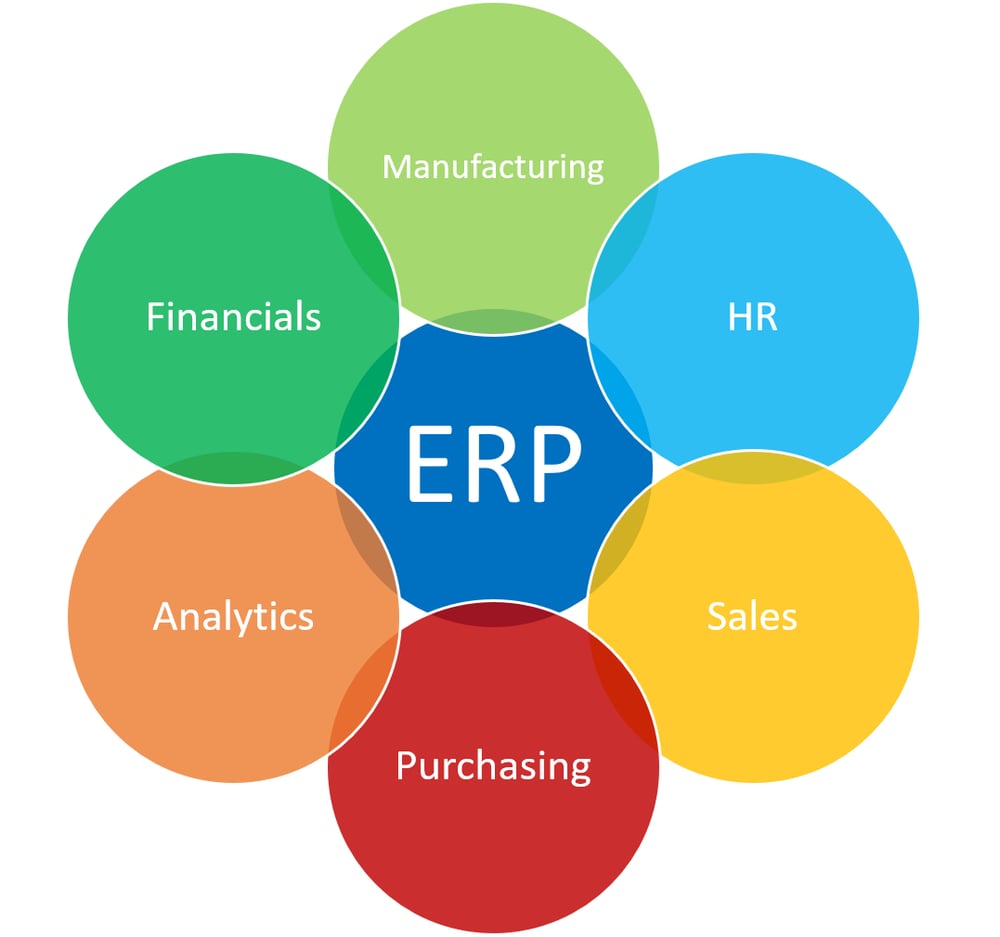
What Is Enterprise Resource Planning (ERP)?
When you outgrow legacy applications and accouting systems such as QuickBooks, you need a business management suite that runs your whole business and not just one business unit.
Enterprise Resource Planing (ERP) is an business application that automates business processes. It provides management tools, processes, reports and KPIs for all the departments including accounting, manufacturing, supply chain, sales, marketing and human resources (HR).
Cloud based unified business management suite (ERP) allows you to have access to central database, which is the single source of truth.
It allows management to perforam assessment of various teams and processes in real-time with measurable KPIs, reports and dashboards.
Finance
The accounting and finance module is the core of any ERP system. Many ERP systems in the market have built upton the core of accouting and finance modules.
Any growing business would need real-time access to accouting payables and accounting receivables to understand financial health of the company.
The finance module can automate purchase order approvals, recurring billing, vendor payments and account reconciliation, which helps faster and efficient month-end close processes.
Read more
Manufacturing
In today’s ERP system, you need production management and manufacturing execution system (MES).
Manufacturing modules allow you to plan for prodution, maintain inventory of raw goods, and help companies look at existing orders, demands and forecasting.
It provides a real-time picture of the shop floor, capturing real-time information on items in progress and finished goods.
It can calculate the average time to produce an item and then compare supply with forecasted demand to plan adequate production.
Read more
Inventory Management
As your business grows, you will need to take control of your inventory management process and explore applications and processes
to automate your entire Inventory Management flow.
ERP system with inventory management should offer tracking of item quantities and warehouse location down to individual SKUs.
The inventory management module enables inventory control by tracking item quantities and location down to individual SKUs.
Inventory Mamangement module should provide a complete control over inventory control including incoming inventory as well as what is available.
It gives you real-time inventory and enables you to project future trends against sales data and existing inventory to avoid stockouts and delays.
Read more
Order Management
An order management module can automate life cycle of an order. Process of taking, approving, scheduling, tracking, fulfilling and being paid for orders are
lifeblood of your business.
ERP’s order management capabilities can streamline your processing by elminating manual bottlenecks, preventing errors,
and establishing a smooth flow from sales quote to order fulfillment.
Read more
Warehouse Management
A warehouse management module can optimize day-to-day warehouse operations by enabling employees to manage picking to packing and shipping processes efficiently.
Cloud based ERP systems of today offers warehouse management module that works efficiently with inventory management and
order management smoothly to improve customer satisfaction.
Mobile RF scanning, processes for putaway and picking, return receipts and cycle count plans can add greater efficiencies to your warehouse employees.
Read more
Customer Relationship Management (CRM)
Customer aquisition and retantion is a key to success for any business. When you have an ERP system that integrates CRM with all the other
ERP modules, it can provide sales staff with purchase history.
CRM can track communication with prospects and maintain history of date and time of calls and emails. Having all these information
accessible in real-time can enable sales staff to convert leads into opportunities into customer acquisition.
Read more
Human Resources Managment (HRM)
HR module is basically a CRM for internam employees. It allows HR to keep track of employees information,
performance reviews, job offers, billable hours, paid-time offs, sick days and benifits information.
HRM can also integrate with payroll processing platforms to automate payroll processing. Using a HRM can eliminate need to
maintain various spreadsheets.
Read more
eCommerce
If you are an online business, you must be using an online website to sell your products. eCommerce can be a module
that integrates with various ERP system modules like order management, and inventory management.
As eCommerce would have access to real-time inventory data, eCommerce can manage display of various items based on quantity, and
provide shipping updates on existing orders.
Read more